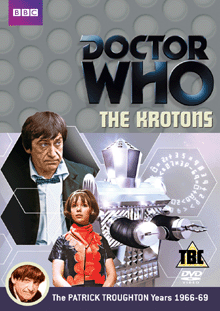 It’s pretty well-known these days that a lot of early Doctor Who stories were junked by the BBC during the late 1960s and early 1970s – standard practice in an age when television was still a fairly youthful medium – but it’s still a shock to realise that of the 119 episodes in which Patrick Troughton appeared, only 69 remain in the archives.
It’s pretty well-known these days that a lot of early Doctor Who stories were junked by the BBC during the late 1960s and early 1970s – standard practice in an age when television was still a fairly youthful medium – but it’s still a shock to realise that of the 119 episodes in which Patrick Troughton appeared, only 69 remain in the archives.
Over half his performances have been taped over and lost forever, unless something turns up in an attic or at a foreign TV station; and while The Krotons will never win any awards as a piece of great telly in its own right, the snapshot it provides of the Troughton era (not to mention the clear parallels between the TARDIS crew of 1968 and their 2012 counterparts) makes it fascinating viewing.
Happily, it’s not just a boring historical document of a different age enlivened only by companions Jamie (Frazer Hines) and Zoë (Wendy Padbury) flashing their pants in quarries and frantically padding when the special effects go awry. The great joy in The Krotons, as in many of the surviving stories of this period, is the chemistry between the principal cast.
Troughton, Hines and Padbury are a delight to watch, the natural camaraderie they developed off-camera shining through the screen like the twin suns of the planet of the Gonds and turning what has to be the great Robert Holmes’s most tedious tale into something very engaging.
Furthermore, it’s interesting to note not only a stylistic similarity between the Second Doctor, Jamie and Zoe and the Eleventh Doctor/Amy/Rory team (there isn’t much of a resemblance in terms of their character arcs, but there’s a lot more to it than just having the Doctor and his Scottish companion constantly taking the piss out of the third member of the gang) but also the unmistakable similarities between Matt Smith’s fast-talking, frequently comedic, occasionally mysterious or impatient but always energetic interpretation of the Doctor and that of his Beatle-haired predecessor.
Whether viewers of today will see through the poorly-paced direction and the woefully rubbish design of the Krotons themselves to what is actually quite a pertinent story of students rebelling against an oppressive state underneath is hard to say, but Troughton, Hines and Padbury present a united front of snarky but genuine friendship that is impossible to dislike.
![]()
 Extras: Of the extra features, only the dubiously-titled The Doctor’s Strange Love focuses on The Krotons itself. The rest wisely concentrate on the Second Doctor’s era as a whole.
Extras: Of the extra features, only the dubiously-titled The Doctor’s Strange Love focuses on The Krotons itself. The rest wisely concentrate on the Second Doctor’s era as a whole.
Second Time Around presents an excellent overview of Troughton’s tenure, pointing out many of the essential tenets of the show – from the concept of the Time Lords to the regeneration of the main character – were first established between 1966 and 1969. ‘Nowadays, Doctor Who sells itself in part on the idea that every few years they can change the actor,’ writer Robert Shearman points out. ‘When Matt Smith took on the part, there was a whole BBC One programme announcing who it was going to be; back then, it was just unheard of.’
There’s also a lot of references to Frazer Hines’ love of the ladies (‘Frazer had a roving eye,’ remarks Deborah Watling, who played Zoë’s predecessor Victoria) – something not exactly dispelled by the actor himself. ‘It had women walking around in plastic shorts and black Gestapo shiny caps,’ he sighs wistfully of the unmade story, The Prison in Space. ‘Big bosoms, God knows what. I wish we’d done that show.’
There’s more of the same in the second featurette, Doctor Who Stories: Frazer Hines, plus an apt description of the TARDIS dematerialisation noise (‘A male warthog chatting a female warthog up with a hippo trying to get in on the act’) and a genuine sense of the close relationship he shared with Patrick Troughton and how hard everyone connected with the show at the time worked to bring it to the screen for more than forty weeks a year.
Hines’ irrepressibility – not to mention Wendy Padbury’s charm – is sorely missed on a commentary that is heavy on participants but unusually light on entertainment.
![]()
Released on DVD on Monday 2nd July 2012 by BBC Worldwide.
What are your memories of The Krotons? Let us know below…

